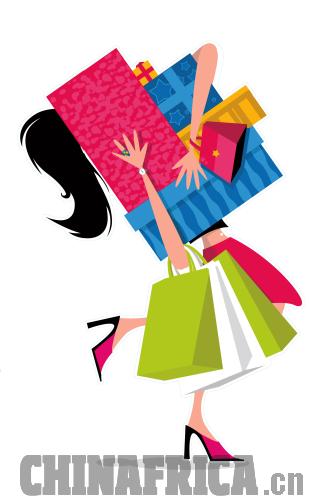| 
New statistics published by the U.S. -based Women's Wear Daily earlier this year predicted that Chinese consumers will make up nearly 50 percent of the luxury goods market by 2020. Currently, they represent 15 percent of that market globally and are Louis Vuitton's biggest customer group. This is a huge shift, with major implications about changing lifestyles in a country that is still developing. Huang Chun, who works with China Power Engineering Consulting Group Corp., and Beijing-based South African Tebogo Lefifi, Director of Afric@Work, give their perspectives on the rise of luxury brands.
The Right One Is Best
by Huang Chun
Since finding my current job as an interpreter, I have had many opportunities to go abroad. My colleagues often ask me to buy them skin care products or big brand handbags. When abroad, I notice almost all the popular luxury brand stores are crowded with Chinese tourists rushing to buy the the latest fashions.
On the Avenue des Champs-Élysées in Paris, Chinese customers wait in long lines at the Louis Vuitton store. Many have their shopping lists in hand, and their bills could reach into the tens of thousands. In some luxury watch shops, Chinese nouveaux riches ask shop assistants to wrap up watches of different styles on display. There's not much concern about the price. Even foreigners are amazed at the Chinese passion for luxury goods.
I still remember an experience in a Coach store in the United States. I was waiting in line for the cashier, with a Chinese man standing behind me carrying four handbags in the latest styles. "Excuse me, do you know the brand of these bags?" he asked me. I smiled. "Why are you buying them?" I asked. "I saw the store was crowded with people and guessed it must be a big brand," he said. "They are gifts I'm bringing back for my friends."
There are many reasons why the Chinese are buying up luxury goods. For one, they are of better quality and design. But is it worth it? I think their selling prices are far more than their real value, and their actual labels account for a large part of this. It's blind pursuit of luxury after rapid growth of personal wealth. This pursuit has become an emotional and social attachment, and luxuries are now a badge of social status and wealth in China. And those nouveaux riches are fond of brands that show off their social status and wealth.
Chinese luxury shopping has one very important characteristic: people buy these items overseas. Luxury goods in Europe and North America are about one-third cheaper than they are in China, due to the country's luxury tax. These customers are falling for the idea that "the more you buy, the more you save." They shop abroad, believing that they are buying discounted goods. But are these luxury goods really right? I think only the right one is best.
Localized Luxury
by Tebogo Lefifi
Luxury brands send out a message that the owner is exclusive, discerning, and lives well. I'm not a big fan. Currently, I'm establishing a luxury lifestyle concierge service in South Africa, and to offer top-notch service I have to keep note of luxury brands and know which have the highest pull.
I take an existential approach to luxury. A luxury item must provide me with extra pleasure by flattering all my senses. For example, my favorite pair of G-Star jeans release essential oils and vitamins on my skin when I wear them. They're worth the money I spent. They go beyond their brand name, beyond exceptionally engineered design: they make my skin sing.
Luxury brands tend to egg on conspicuous consumption. Coming from an emerging economy I am uncomfortable with poverty. While the gap between the poor and rich widens, I think a little sensitivity is required. It's unnecessary for the new middle and upper classes to be so ostentatious with their new-found wealth.
Even though I'm not a big fan of luxury brands, I have a lot of respect for the top companies. I'm impressed by their delivery on quality and how they weathered the global financial crisis. Brands like Emergildo Zegna produce the best textiles with timeless designs. But my luxury item spending tends to be in cosmetics, IT gadgets and home design (fashion is fickle and I consider clothes too disposable).
I think China and South Africa have similar luxury consumer trends. Consumption is concentrated with famous brands like Louis Vuitton and in items like clothing, watches and cars. There's a slow but progressive move toward buying private jets and holiday homes. Naturally in a country where people have been starved of social position, there's a real need to make a statement and combat the image of poverty. People wear their luxury labels on their sleeves – figuratively and literally.
Although South African culture trends with Chinese, I doubt we can ever be a frontier market for luxury brands. South Africans are very particular, and appreciate locally-produced items. We pay a premium for South African wines rather than their French counterparts. We buy holiday homes in South Africa rather than Palm Beach.
We may not be the gunning for the top spot in luxury goods consumption, but we are claiming our place in its business. South Africa has spawned companies like Richemont SA, which owns subsidiaries like Cartier, Chloe, Mont Blanc and Shanghai Tang. I anticipate that more luxury products companies, hopefully in partnership with China, will be established in the future. |